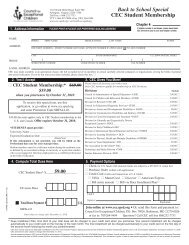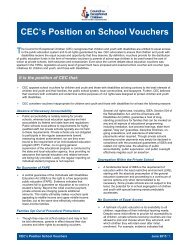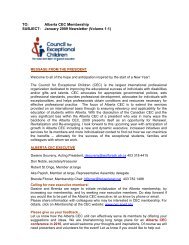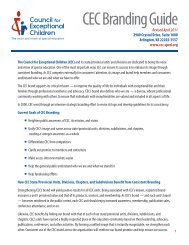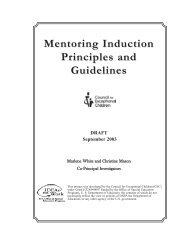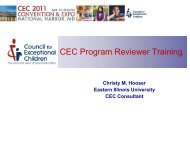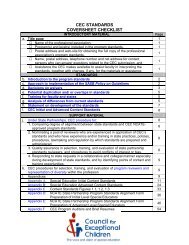What Every Must Know Special Educator - Council for Exceptional ...
What Every Must Know Special Educator - Council for Exceptional ...
What Every Must Know Special Educator - Council for Exceptional ...
Create successful ePaper yourself
Turn your PDF publications into a flip-book with our unique Google optimized e-Paper software.
CEC Content Standards<br />
7. Instructional Planning<br />
Individualized decision-making and instruction is at the center of special education<br />
practice. <strong>Special</strong> educators develop long-range individualized instructional<br />
plans anchored in both general and special education curricula. In addition,<br />
special educators systematically translate these individualized plans into carefully<br />
selected shorter-range goals and objectives taking into consideration an<br />
individual’s abilities and needs, the learning environment, and a myriad of<br />
cultural and linguistic factors. Individualized instructional plans emphasize<br />
explicit modeling and efficient guided practice to assure acquisition and fluency<br />
through maintenance and generalization. Understanding of these factors<br />
as well as the implications of an individual’s exceptional condition, guides the<br />
special educator’s selection, adaptation, and creation of materials, and the use<br />
of powerful instructional variables. Instructional plans are modified based<br />
on ongoing analysis of the individual’s learning progress. Moreover, special<br />
educators facilitate this instructional planning in a collaborative context including<br />
the individuals with exceptionalities, families, professional colleagues, and<br />
personnel from other agencies as appropriate. <strong>Special</strong> educators also develop a<br />
variety of individualized transition plans, such as transitions from preschool<br />
to elementary school and from secondary settings to a variety of postsecondary<br />
work and learning contexts. <strong>Special</strong> educators are com<strong>for</strong>table using appropriate<br />
technologies to support instructional planning and individualized instruction.<br />
Beginning special educators demonstrate their mastery of this standard through<br />
the mastery of the CEC Common Core <strong>Know</strong>ledge and Skills, as well as through<br />
the appropriate CEC <strong>Special</strong>ty Area(s) <strong>Know</strong>ledge and Skills <strong>for</strong> which the program<br />
is preparing candidates.<br />
8. Assessment<br />
Assessment is integral to the decision-making and teaching of special educators<br />
and special educators use multiple types of assessment in<strong>for</strong>mation <strong>for</strong> a<br />
variety of educational decisions. <strong>Special</strong> educators use the results of assessments<br />
to help identify exceptional learning needs and to develop and implement individualized<br />
instructional programs, as well as to adjust instruction in response to<br />
ongoing learning progress. <strong>Special</strong> educators understand the legal policies and<br />
ethical principles of measurement and assessment related to referral, eligibility,<br />
program planning, instruction, and placement <strong>for</strong> individuals with exceptional<br />
learning needs, including those from culturally and linguistically diverse backgrounds.<br />
<strong>Special</strong> educators understand measurement theory and practices <strong>for</strong><br />
addressing issues of validity, reliability, norms, bias, and interpretation of assessment<br />
results. In addition, special educators understand the appropriate use and<br />
limitations of various types of assessments. <strong>Special</strong> educators collaborate with<br />
families and other colleagues to assure nonbiased, meaningful assessments and<br />
decision-making.<br />
<strong>Special</strong> educators conduct <strong>for</strong>mal and in<strong>for</strong>mal assessments of behavior, learning,<br />
achievement, and environments to design learning experiences that support<br />
the growth and development of individuals with exceptional learning needs.<br />
<strong>Special</strong> educators use assessment in<strong>for</strong>mation to identify supports and adaptations<br />
required <strong>for</strong> individuals with exceptional learning needs to access the general<br />
curriculum and to participate in school, system, and statewide assessment<br />
programs. <strong>Special</strong> educators regularly monitor the progress of individuals with<br />
exceptional learning needs in general and special curricula. <strong>Special</strong> educators<br />
use appropriate technologies to support their assessments.<br />
Beginning special educators demonstrate their mastery of this standard through<br />
the mastery of the CEC Common Core <strong>Know</strong>ledge and Skills, as well as through<br />
the appropriate CEC <strong>Special</strong>ty Area(s) <strong>Know</strong>ledge and Skills <strong>for</strong> which the program<br />
is preparing candidates.<br />
Corresponding State<br />
Standards<br />
SECtion : toolS and StratEgiES <strong>for</strong> uSing thE StandardS



